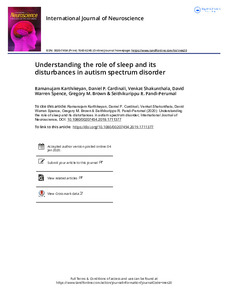Por favor, use este identificador para citar o enlazar este ítem:
https://repositorio.uca.edu.ar/handle/123456789/13666| Título: | Understanding the role of sleep and its disturbances in autism spectrum disorder | Autor: | Karthikeyan, Ramanujam Cardinali, Daniel Pedro Shakunthala, Venkat Spence, David Warren Brown, Gregory M. Pandi Perumal, Seithikurippu R. |
Palabras clave: | TRASTORNO DEL ESPECTRO AUTISTA; TRASTORNOS DEL SUEÑO; MELATONINA; TRATAMIENTO TERAPEUTICO; AUTISMO | Fecha de publicación: | 2020 | Editorial: | Taylor & Francis | Cita: | Karthikeyan, R., Cardinali, D. P., Shakunthala, V., Spence, D. W., Brown, G.M., Pandi Perumal, S. R. Understanding the role of sleep and its disturbances in autism spectrum disorder [en línea]. Postprint del artículo publicado en: International Journal of Neuroscience. 2020, 130 (10). doi: 10.1080/00207454.2019.1711377. Disponible en: https://repositorio.uca.edu.ar/handle/123456789/13666 | Resumen: | Abstract: Sleep difficulties are one of the significant complications associated with autism spectrum disorder (ASD). Despite their possible role as contributors to the overall symptoms of ASD, the symptoms of disturbed sleep experienced by many affected patients have only recently started to receive attention from clinicians, caretakers, and family members. Many types of sleep disorders have been reported in ASD individuals, but these have not been categorized under a common terminology. Nevertheless, several studies have established that a positive relationship exists between the occurrence of sleep difficulties and heightenedsymptomatology in ASD children. When ASD children show evidence of sleep problems there is also an increased frequency of behavioral problems such as social impairment, decreased cognitive functioning, aggressiveness, and anxiety. Several hypotheses have been put forward regarding the linkage between disturbed sleep and ASD. These have included suggestions that sleep difficulties and other ASD symptoms are induced by disruption of the circadian clock, the presence of comorbid physical or psychological conditions, elevated anxiety levels, or emotional distress. This article reviews the use of sleep therapies in ASD, among which melatonin has shown promise because of its lack ofsignificant side effects. A better understanding of sleep problems in the etiology of ASD, their impact on the symptoms and behavior of ASD individuals, and their potential use as a secondary aid for treating ASD would represent a significant contribution todevelop strategies to manage the disorder. | URI: | https://repositorio.uca.edu.ar/handle/123456789/13666 | ISSN: | 0020-7454 1543-5245 (online) |
Disciplina: | MEDICINA | DOI: | 10.1080/00207454.2019.1711377 | Derechos: | Acceso abierto | Fuente: | International Journal of Neuroscience Vol. 130, No.10.2020 |
| Aparece en las colecciones: | Artículos |
Ficheros en este ítem:
| Fichero | Descripción | Tamaño | Formato | |
|---|---|---|---|---|
| understanding-role-sleep.pdf | 791,88 kB | Adobe PDF |  Visualizar/Abrir |
Visualizaciones de página(s)
54
comprobado en 27-abr-2024
Descarga(s)
472
comprobado en 27-abr-2024
Google ScholarTM
Ver en Google Scholar
Altmetric
Altmetric
Este ítem está sujeto a una Licencia Creative Commons

